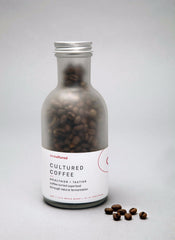Why Buy Whole Bean Coffee?
If you're a coffee drinker, you may know it can be found in a variety of formats. From instant and ground to whole bean coffee, everyone has their preference.
However at eatCultured we're fans of whole bean coffee and believe you should be too. In this week's blog post, we compare different coffee formats.
Freeze-dried (Instant) Coffee
Also called soluble coffee, coffee crystals and coffee powder, coffee can be freeze-dried or commercially spray dried.
After brewing a strong batch of coffee, water is removed to leave the dry solids, at which point they can be frozen or air dried. To prepare this kind of coffee, you only need to add hot water or milk to rehydrate.
Initially patented in France and New Zealand in the late 19th Century, instant coffee was first sold commercially in the US in 1909 by Belgian inventor George Washington.
Freeze-dried coffee was developed in the US shortly before World War II. The process for preserving coffee in this way, among other food and health products, was discovered following research into vacuum technology.
The format was introduced to other countries during the war including the UK, where this kind of coffee is still popular. Countries such as India and Korea mix hot milk instead of water to make up their instant coffee.
Pros
This form of coffee has the longest shelf-life and will stay fresh for years in the pantry. It's easy to prepare a cup without extra equipment.
Cons
Coffee beans are subjected to a lot of stress before grinding and freezing. This will dampen many of the more delicate bean flavors to begin with.
Due to the longer shelf-life, instant coffee may be made from more cost-effective low-grade beans set to a dark roast to achieve a consistent flavor profile and mask unwanted flavors. This roast profile can increase coffee bitterness, result in a less flavorful cup and potentially increase factors like stomach irritation.
Ground Coffee
Ground coffee has been around for almost as long as humans have been drinking it. However largescale commercialization of coffee in the 20th Century away from speciality coffee shops introduced a variety of ways for customers to stock up on their coffee for the week, including ground coffee.
In the 1990s, the introduction of coffee pods has since made this ground format a ubiquitous product the world over.
Pros
Since ground coffee has already been roasted and ground, all that's left to do to make a cup of coffee is brew it. This saves time and on extra equipment.
Ground coffee typically stays fresh for 3-5 months (pods slightly longer as they're air-tight).
Cons
Ground coffee tends to lose its freshness very quickly (within minutes) due to oxidation, exposure to light and moisture in the air. As coffee loses freshness, some of its flavor characteristics dissipate into the air too. The most delicate flavors disappear the fastest, leading to a cup that's potentially skewed towards bolder, bitter flavors.
While coffee pods are engineered to preserve more freshness in coffee grounds, they're also a huge source of waste that doesn't decompose. Some consumers also have concerns about the pods leaching plastic chemicals into the coffee during use as the pods heat up as well as into the ground.
Whole Bean Coffee
This is the simplest form of coffee and our personal favorite here at eatCultured. Dried, roasted coffee (and in our case, control fermented) beans are ready to grind and brew.
Pros
Less tampering with the beans means maximum freshness and health benefits for your coffee! Both the delicate and more robust flavors are preserved in the beans. Perfect for connoisseurs.
Whole bean coffee has a slightly longer shelf-life in the pantry than ground coffee, at 6 months. Since the beans are intact, fewer of the volatile flavor oils can escape into the air during storage.
Cons
Whole beans need to be ground before brewing, which requires investing in a grinder or coffee machine depending on your serving preference.
To Freeze or Not To Freeze?
Coffee is hygroscopic, which means it easily absorbs flavors from its surroundings. Most freezers let a little air inside, which is why food stored in the freezer for a long time can pick up a smell.
While putting your coffee in the freezer can prolong freshness, it can have a negative effect on the taste. For that reason the eatCultured team prefers to work with fresh beans.
Learn more about eatCultured's first healthy fermented product: Cultured Coffee


Leave a comment
Please note, comments must be approved before they are published